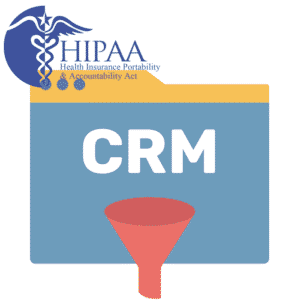HIPAA CRM or HIPAA Software?
Customer Relationship Management (CRM) tools streamline communications with customers, and in the healthcare space, patients. A good healthcare CRM tool should integrate your systems, allowing you to easily track and communicate with patients. As with all applications in healthcare, the CRM tool you use must be HIPAA compliant.
A HIPAA compliance software helps you manage, track and conduct all necessary parts of a full compliance plan and is sometimes called a HIPAA CRM. A good compliance software will include all required agreements as well as audits, and assessments.

The Health Insurance Portability and Accountability Act (HIPAA) set forth standards in which personal health information (PHI) must be handled. PHI is any health information that is individually identifiable such as name, date of birth, Social Security number, credit card number, payment information, etc.
Many CRM tools have vast integration capabilities that allow organizations to manage multiple aspects of a customer relationship from a single application.
When deciding which healthcare CRM tool to use, organizations should look for the following:
- Patient tracking allows an organization to have access to anything to do with a specific patient. This includes contact information, medical history, communication history, and documents such as patient intake forms.
- Call capabilities allow you to schedule future calls as well as track previous calls.
- Customer support through integration of sales and post-sales support solving customer issues is easier and faster, in turn, increasing customer satisfaction.
- Promotes patient engagement organizations can quickly create personalized communication through appointment reminders, post-discharge communication, and follow-up notes.
- Marketing campaigns are generated and targeted to specific patients. Healthcare CRM tools automate your marketing efforts so that patients receive communications in a timely fashion.
- Mailings can be easily created so that organizations can do direct mailings or mass mail campaigns.
- Reports allow you to determine the effectiveness of your CRM.
Additionally, to be a healthcare CRM tool, an organization must be able to issue security roles within the platform. HIPAA law dictates that when handling PHI, individuals must access the “minimum necessary” to perform their job functions. Healthcare CRM tools give administrators the ability to control which users have access to what information, satisfying the law.
Lastly, once an organization chooses which healthcare CRM platform to use, you must sign a business associate agreement (BAA) with that company. HIPAA regulations mandate that a BAA is signed between parties transmitting or maintaining PHI before any sensitive information can be sent. A BAA limits liability for both parties in the event of a data breach. With a BAA in place, only the party responsible for the breach will be held liable, however without a signed BAA both parties are held accountable.
Healthcare CRM tools allow organizations to quickly monitor and respond to patients. An effective CRM tool simplifies communications, increasing patient engagement and satisfaction.




